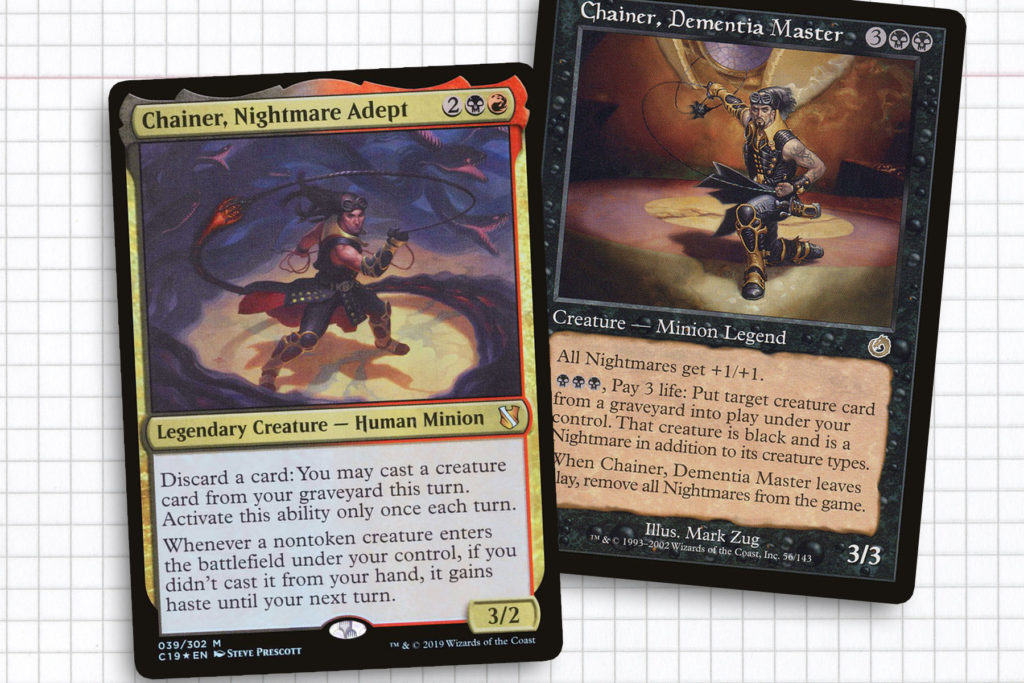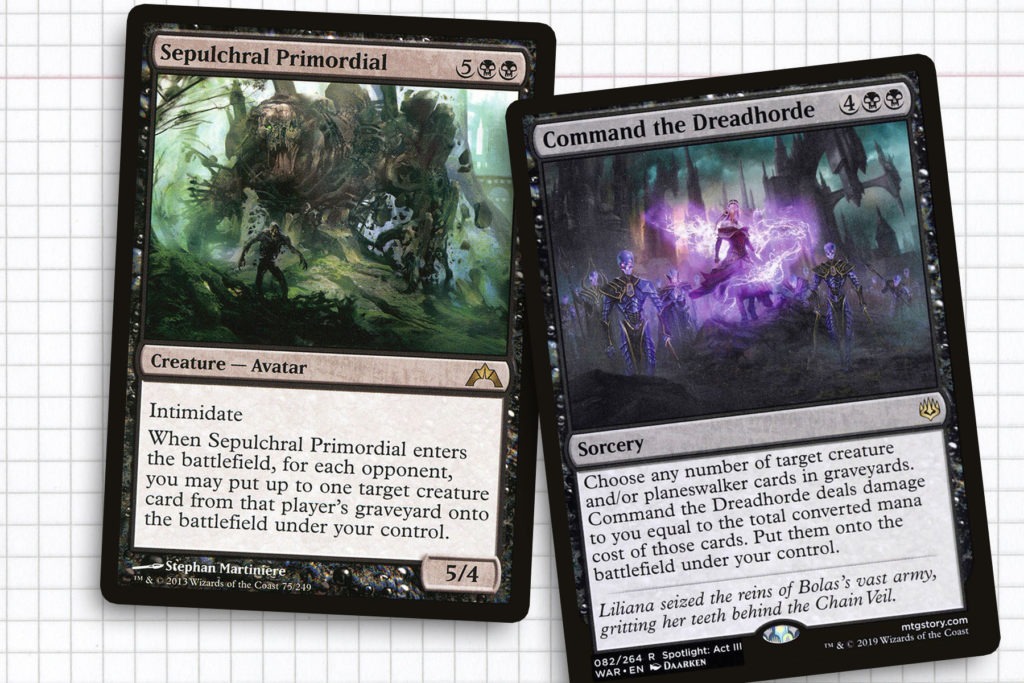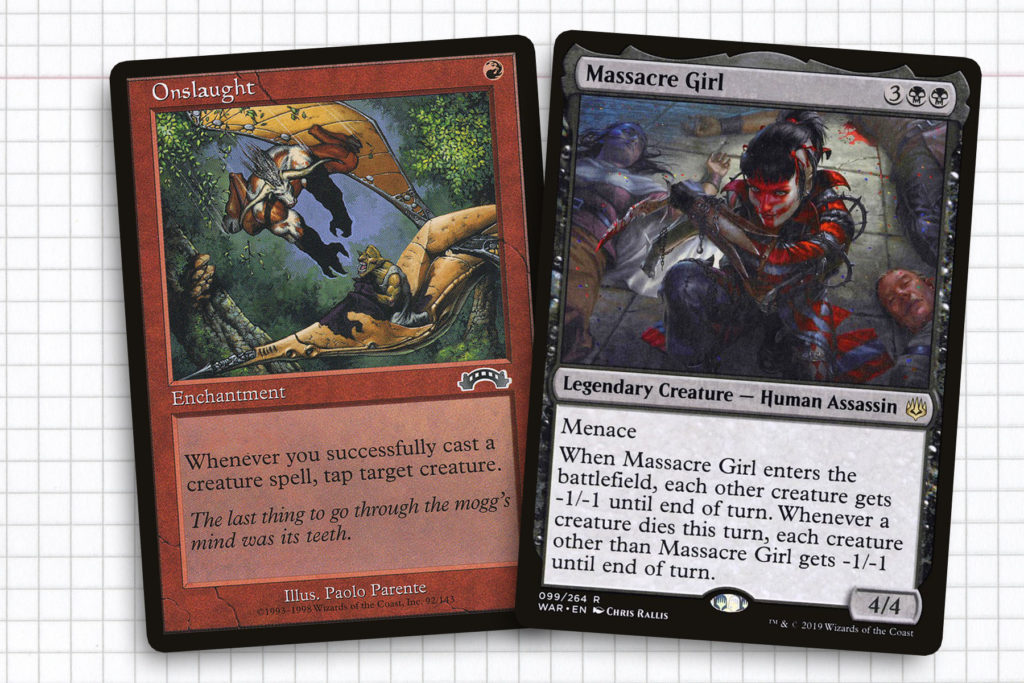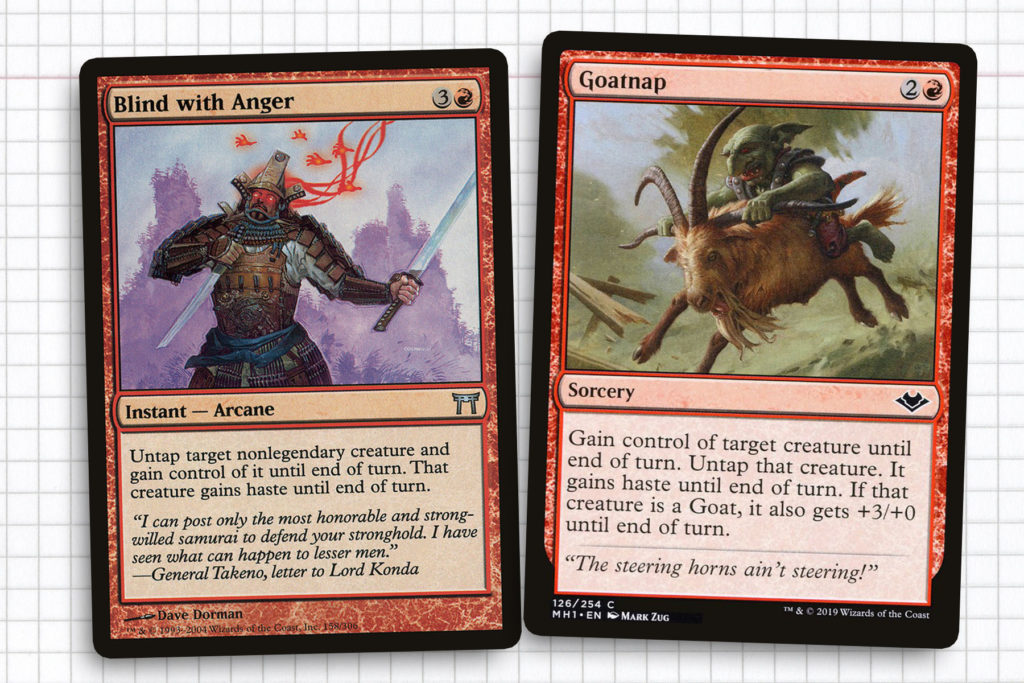In these trying and isolating times, I find that Magic helps me retain some of my sanity. Last weekend’s Commandfest Online was a very good example of the power the game has. Simply playing a few games over webcam reignited my passion for Commander in a way that had been lying dormant for months. With this new found excitement, I began thinking about what new general I was most drawn to building around.
The more I dig into the legendary creatures given to us in Commander 2019, the more I fall in love with them. I especially enjoy when an iconic character from the novels gets a fresh set of paint and comes back with all of the acclaim they deserved. This week’s general, Chainer, Nightmare Adept, is just such a character. I’ve put off building around Chainer for too long. We’re going to take all the fun of Reanimator and black and infuse it with the relentless speed of red.
Let’s take a look at the deck list and walk through the strategy driving it.
Commander: Chainer, Nightmare Adept
Creatures: Anje’s Ravager, Avatar of Discord, Avatar of Slaughter, Avatar of Woe, Balthor the Defiled, Chainer, Dementia Master, Corpse Connoisseur, Crypt Champion, Etali, Primal Storm, Fleshbag Marauder, Garna, the Bloodflame, Gravebreaker Lamia, Kokusho, the Evening Star, Magus of the Wheel, Massacre Girl, Merciless Executioner, Mikaeus, the Unhallowed, Molten Primordial, Plaguecrafter, Phyrexian Delver, Sepulchral Primordial, Sheoldred, Whispering One
Enchantments: Dragon Shadow, Onslaught, Sneak Attack, Warstorm Surge
Artifacts: Anvil of Bogardan, Charcoal Diamond, Fellwar Stone, Fire Diamond, Lightning Greaves, Mask of Memory, Nim Deathmantle, Rakdos Signet, Sol Ring, Swiftfoot Boots, Thran Dynamo
Planeswalker: Liliana, Death’s Majesty
Instants: Act of Aggression, Bedevil, Blind with Anger, Fated Return, Liliana’s Triumph, Songs of the Damned, Thrilling Encore, Word of Seizing
Sorceries: Avacyn’s Judgment, Besmirch, Blood for Bones, Cathartic Reunion, Command the Dreadhorde, Disrupt Decorum, Final Parting, Goatnap, Limits of Solidarity, Mass Mutiny, Mob Rule, Reanimate, Reforge the Soul, Syphon Mind, Unearth, Wheel of Fate
Land: 9 Mountain, 16 Swamp, Akoum Refuge, Ash Barrens, Blood Crypt, Bloodfell Caves, Cinder Barrens, Command Tower, Dragonskull Summit, Foreboding Ruins, Luxury Suite, Myriad Landscape, Smoldering Marsh, Temple of Malice

Chanier’s Torment
Chainer as a character goes back to my earliest days of Magic. I came into the game near the release of Onslaught, and the first novels I read were from the Odyssey block. Within the trio of books, Chainer plays a large role as a close friend to the protagonist, Kamahl, Pit Fighter. He eventually becomes consumed by the allure of the Mirari, ultimately bringing all the nightmares in the minds of the evil Cabal to life, mistakenly absorbing them into his body, and has to be mercifully stopped by Kamahl. (You can read our reviews of the trilogy here.)
The two designs for Chainer highlight an aspect I love when a mono-color general gets redesigned and takes on a secondary color to open up their color identity. Both versions of Chainer deal with reanimating creatures in one form or another. But Chainer, Nightmare Adept works well with the madness mechanic: it gives us a general that doesn’t explicitly ask you to use it, but rewards savvy players that are willing to do the minimal amount of research. Of course, from the deck list you can tell I strayed away from madness, because it doesn’t show up on as many creatures as I would have liked. The ability to dig deeper into the available colors for larger creatures became more and more appealing as time went on.
While I miss the ties to the nightmare creature type seen on Chainer, Dementia Master, I have to admit that Chainer, Nightmare Adept is a genuinely cool card to build around. The non-linear design is much appreciated. While I don’t believe the Chainer has the same versatility as Volrath, the Shapestealer, I appreciate that there are multiple surface level ways to build the deck.

Dead and Back Again
Regardless of the fact that we have a general who can reanimate every turn, I wanted to build in a handful of other ways we can bring creatures back to take advantage of Chainer’s haste-granting ability. In the case of Chainer, Dementia Master, Sepulchral Primordial, and Fated Return, I wanted the ability to grab creatures from any graveyard. Chainer, Dementia Master is a surprisingly underplayed card; while it admittedly doesn’t stack up against modern legendary creatures, he can dig a lot of creatures out of our opponents’ graveyards. And when he leaves play, he even exiles them, acting as a roundabout graveyard hate card.
When we focus on our graveyard, we have a multitude of available options. Nim Deathmantle is a worst-kept secret in Commander, but it really fits here. Mikaeus, the Unhallowed is a similar boat, giving our creatures extra lives and the ability to fight back against the board sweeper coming at us from around the table. Lastly, there is the workhorse that is Sheoldred, Whispering One. I don’t normally give a glowing endorsement to the praetors, only because they often warp games. But since the creatures we are reanimating will likely be gaining haste, I feel it helps drive the game to a conclusion.

Entering with Style
Since we are in the business of reanimating creatures, we should probably focus in on a few of the desired synergies I had in mind for the deck, like chaining Crypt Champion into Avatar of Discord or recovering Molten Primordial for a second copy of Mass Mutiny. Because Chainer can discard the creature we intend to cast from our graveyard, we can also surprise the table with hand disruption with Magus of the Wheel, skillfully timed removal with Massacre Girl, or literally mayhem with Avatar of Slaughter.
Another small but relevant theme within the deck: unique enters-the-battlefield effects. Since we know that we can reasonably cast a creature from our graveyard and grant it haste, effects like Dragon Shadow, Onslaught, and Warstorm Surge are no-brainers. I’ve loved Onslaught for a very long time, but I don’t often have a decent chance to plug it into a deck. Being able to tap down a creature every time something enters my battlefield can cause combat math to shift dramatically and makes it very easy to craft alpha strike situations.

All’s Fair Play
For all the fun you can have playing a Reanimator strategy, I’ve never found it appealing enough to work with long-term. Because we are so dependent on creatures, I often find myself without a really good attacker. That’s where the Threaten package offered by red can push this deck over the top. It may seem like overkill, but having the full lineup of Act of Aggression, Blind with Anger, Besmirch, Goatnap, Limits of Solidarity, and Word of Seizing means that we should be ready to acquire a promising creature whenever the need arises.
Gaining control of creatures momentarily is an obvious strength. Controlling the flow of combat in red is something far more potent. This is why we will not only be taking people’s creature en masse with Mob Rule or Mass Mutiny, but also pushing our opponents to be our weapons by using politics through Disrupt Decorum and forcing them to get blood on their own hands.
I wish I had some grand unified theory about Chainer. I see him as an unknown quantity for the time being, something that will likely never become so ubiquitous as to cause the rest of a play group to metagame against him. At the end of the day, I’m simply excited to see what happens when a Reanimator strategy combines with a hasty combat strategy. I love the idea of tying together different synergies to chain out a number of creatures, line the battlefield with enters-the-battlefield effects that put my opponents to be on the back foot, or ultimately using their creatures against them.
Next week, I will be capping off the best basic land art series with Donny Caltrider, as we do an investigation into the basic Forest. I’m excited to finally finish this leg of the series and start brainstorming ideas for where we can go next. But until then, thanks for reading.
Ryan Sainio is a Graphic Designer who writes about EDH and the EDH community. He has been playing Magic: The Gathering since 7th Edition in 2002 and values flavorful and fun gameplay over competitively optimized decks.

